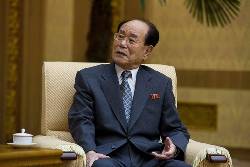SEOUL, South Korea (AP) — Kim Yong Nam, a longtime North Korean ceremonial head of state best known for his trademark propaganda-filled speeches with a deep, booming voice in support of the ruling Kim dynasty, has died, state media reported Tuesday.
The Korean Central News Agency said that Kim Yong Nam, former president of the Presidium of North Korea’s rubber-stamp Supreme People’s Assembly from 1998 to 2019, died Monday of multiple organ failure at the age of 97.
KCNA said that leader Kim Jong Un visited the bier of Kim Yong Nam early Tuesday to express deep condolences over his death. Kim Yong Nam is not related to Kim Jong Un, the third generation of his family to rule North Korea since its foundation in 1948.
“Comrade Kim Yong Nam faithfully upheld the party's ideology and leadership and displayed his distinctive competence and experience on the international stage, making notable contributions in the history of our country's politics and diplomacy,” KCNA said.
KCNA said North Korea will hold a state funeral for him on Thursday. It released a list of 100 funeral committee members with Kim Jong Un’s name at the top.
Ceremonial head of state for 2 decades
Born in 1928 into “a patriotic family” resisting then Japanese colonial rule of the Korean Peninsula, Kim Yong Nam held a string of top posts since he joined the ruling Workers’ Party in the mid-1950s, according to KCNA. His tenure as head of North Korea's parliament made him the country's nominal head of state and allowed him to appear frequently in state media greeting visiting foreign dignitaries.
But the true power was held by the Kim family, which maintains absolute control of North Korea's 26 million people. Kim Jong Un, grandson of state founder Kim Il Sung, took power upon his father Kim Jong Il’s death in 2011 in the country’s second hereditary power transfer.
In February 2018, Kim Yong Nam traveled to South Korea with Kim Jong Un’s influential sister, Kim Yo Jong, to attend the opening ceremony of the Pyeongchang Winter Olympics as Pyongyang sought better ties with Seoul and Washington after years of heightened animosities on the Korean Peninsula. At the opening ceremony, Kim Yong Nam and Kim Yo Jong sat within feet of then-U.S. Vice President Mike Pence, though the two sides made no apparent contact.
That Pyeongchang trip made Kim Yong Nam the highest-level North Korean official to visit South Korea since 2014. North Korea's temporary diplomatic openness peaked when Kim Jong Un met U.S. President Donald Trump three times from 2018-19, before the high-stakes summitry collapsed due to wrangling over U.S.-led sanctions on North Korea. Trump recently expressed his desire to meet Kim again during his trip to South Korea last week, but North Korea didn't respond.
Kim Yong Nam's influence was seen as waning due to his age. In April 2019, he was replaced by Choe Ryong Hae, one of Kim Jong Un’s close confidants who had previously served as the top political officer of the North’s 1.2 million-member military.
Quintessential bureaucrat
Kim Yong Nam’s career epitomized that of a successful North Korean bureaucrat. He survived major political purges through the 1970s. He was appointed to the powerful Politburo in 1978 and served 15 years as foreign minister, starting in 1983. He was left intact even when Kim Jong Un orchestrated a series of executions, including the spectacular 2013 killing of his powerful uncle, in the early years of his rule in an apparent bid to remove his potential rivals and cement his grip on power.
North Korea watchers also say Kim Yong Nam had an expertise in third-world diplomacy. He was a frequent participant in gatherings of nations that consider themselves independent from major power blocs, including the 2012 Non-Aligned Movement summit in Iran.
People who met Kim Yong Nam described him as mild-mannered but staunch in his opinions.
“I found Kim Yong Nam a puzzling figure. In greetings before business began, he was cordial and relaxed, but once at work, he relentlessly followed his script in a way that reminded of former Soviet foreign minister Andrei Gromyko,” former Washington Post reporter Don Oberdofer wrote in his book, “The Two Koreas.”
In a testament to his loyalty to the ruling dynasty, Kim Yong Nam read an elegy to Kim Il Sung when he died in 1994. Kim Yong Nam also undertook the job of formally nominating Kim Jong Il to be chairman of the National Defense Commission after the son observed a three-year mourning period.
A native of Pyongyang, Kim Yong Nam studied at Kim Il Sung University and Moscow State University.
____
Former Associated Press writer Sam Kim contributed to this report.
...


 Copyright © 1996 - 2025 CoreComm Internet Services, Inc. All Rights Reserved. | View our
Copyright © 1996 - 2025 CoreComm Internet Services, Inc. All Rights Reserved. | View our